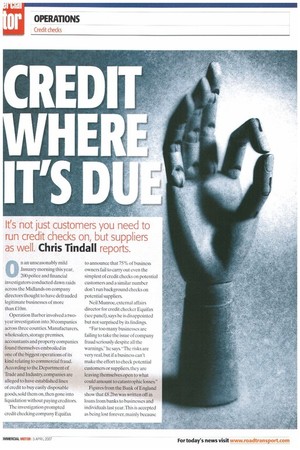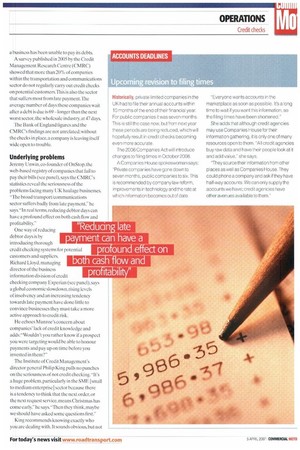It's not just customers you need to run credit checks on, but suppliers as well. Chris Tindall reports.
Page 60

Page 61

If you've noticed an error in this article please click here to report it so we can fix it.
0 n an unseasonably mild January morning this year, 200 police and financial investigators conducted dawn raids across the Midlands on corn pany directors thought to have defrauded legitimate businesses of more than £10m.
Operation Barber involved a twoyear investigation into 30 companies across three counties. Manufacturers, wholesalers, storage premises, accountants and property companies found themselves embroiled in one of the biggest operations of its kind relating to commercial fraud. According to the Department of Trade and Industry,companies are alleged to have established lines of credit to buy easily disposable goods, sold them on, then gone into liquidation without paying creditors.
The investigation prompted credit checking company Equifax to announce that 75% of business owners fail to carry out even the simplest of credit checks on potential customers and a similar number don't run background checks on potential suppliers.
Neil Munroe, external affairs director for credit checker Equifax (see panel), says he is disappointed but not surprised by its findings.
"Far too many businesses are failing to take the issue of company fraud seriously despite all the warnings," he says. "The risks are very real,but if a business can't make the effort to check potential customers or suppliers, they are leaving themselves open to what could amount to catastrophic losses."
Figures from the Bank of England show that £8.2bn was written off in loans from banks to businesses and individuals last year.This is accepted as being lost forever. mainly because a business has been unable to pay its debts.
A survey published in 2005 by the Credit Management Research Centre (CMRC) showed that more than 20% of companies within the transportation and communications sector do not regularly carry out credit checks on potential customers. This is also the sector that suffers most from late payment.The average number of days these companies wait after a debt is due is 69— longer than the next worst sector, the wholesale industr■,,, at 47 days.
The Bank of England figures and the CMRC's findings are not unrelated; without the checks in place. a company is leaving itself wide open to trouble.
Underlying problems Jeremy Unwin, co-founder of OnStop, the web-based registry of companies that fail to pay their bills (see panel), says the CMRC's statistics reveal the seriousness of the problems facing many UK haulage businesses. "The broad transport/communications sector suffers badly from late payment.he says. In real terms, reducing debtor days can have a profound effect on both cash flow and profitability."
One way of reducing debtor days is by introducing thorough credit checking systems for potential customers and suppliers. Richard Lloyd, managing director of the business information division of credit checking company Experian (see panel), says a global economic slowdown, rising levels of insolvency and an increasing tendency towards late payment have done little to convince businesses they must take a more active approach to credit risk.
He echoes Munroe's concern about companies' lack of credit knowledge and adds: "Wouldn't you rather know if a prospect you were targeting would he able to honour payments and pay up on time before you invested in them?"
The Institute of Credit Management's director general Philip King pulls no punches on the seriousness of not credit checking."It's a huge problem, particularly in the SME [small to medium enterprise] sector because there is a tendency to think that the next order, or the next request service, means Christmas has come early.he says."Then they think, maybe we should have asked some questions first."
King recommends knowing exactly who you are dealing with. It sounds obvious, but not






























































































































































































